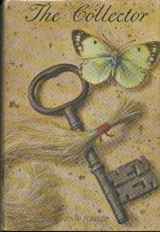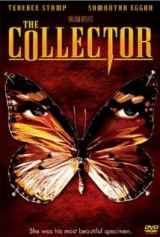Distorted Class in John Fowles’s The Collector
While many people assume that today’s world places a higher value on equality, there’s one system of inequality that remains—class. Specifically, in England the age-old division between the upper class and lower class still exists. There have been many books that examine the English class system, but one book offers a particularly unique perspective—The Collector by John Fowles. Through confusing relationships and conflicting identities, this novel explores how the system can be distorted.

There is no textbook definition of the class system in England—what is known is common knowledge—but not much has changed since its beginnings. People still judge someone on how much land he owns, the accent he has, or the education he received. Upper class people live on large estates, speak the ‘Queen’s Language’, and studied either at Oxford or Cambridge. Some would even describe the upper class as anyone who does not have to buy their own furniture. Lower class people, including the middle class and working class, typically live in smaller dwellings, speak with rougher, ‘country-side’ accents, and studied at lesser-known universities.
There are even subdivisions within the classes. In particular, upper class people occasionally divide themselves between “New money” and “Old money.” In other words, someone’s status may depend on whether his money was inherited or earned over time. For example, an Old money person is more likely to wear an expensive jacket that was passed down through generations. A New money person is more likely to wear the latest fad. These are just a few of the different values and divisions within the English class system.
John Fowles intended for The Collector to explore this system and its dangers. In another one of his novels, The Aristos, Fowles explains that he wanted readers to understand the divisions in a society where prosperity was becoming more widespread in the majority, and power (either by wealth or position) was given to those intellectually unsuited to handle it. These thoughts are the driving force behind the novel’s plot, as well as its critical and commercial success. Published in 1963, The Collector is now considered to be a major British work of the 20th century.
This novel that established Fowles’ reputation as a “great imaginative power” in The Sunday Times is a bizarre story, best appreciated by readers who enjoy a gritty, haunting classic. It is the story of Frederick Clegg and his abduction and imprisonment of Miranda Grey—or rather, his ‘collecting of a beautiful butterfly.’ Clegg narrates the story first, and then Miranda repeats the story through a diary, before returning to Clegg’s narration of her illness and death. This multifaceted view of their relationship gives the reader a glimpse of the English class system, specifically through the theme of “the Few” versus “the Many.”

The Few are described as the “vital, creative, good” individuals of society, i.e. the upper class, while the Many are the “ordinary dull little people who aren’t ashamed of being dull and little” (220-221), i.e. the lower class. Miranda believes she is one of the Few that has to carry the uneducated deadweight of the Many, with whom she includes Clegg despite his wealth. Miranda views Clegg’s status of New money as a “horrid timid copycatting genteel in-between class” (172). From her perspective, even if Clegg could acquire all the necessary characteristics of the Few, he could never truly be a part of Miranda’s class.
In light of this concept, Miranda views her relationship with Clegg as a student/ teacher relationship. In her diary, Miranda writes that she will teach Clegg how decent human beings—i.e. the Few—live (137), so that he will set her free. She even tells Clegg at one point that she’s trying to show him his “ignorant” ways after he complains that she bosses him around more than his aunt ever did (198). Ironically, Miranda compares herself to Emma Woodhouse and Marianne Dashwood (166, 215). Both are characters from different Jane Austen novels who think of themselves as teachers, but in reality need to learn a lesson. Emma is an ignorant heiress who thinks her matchmaking skills are absolute, but she ends up creating a mess of relationships throughout the story. Marianne tries to teach her older, reserved sister about love and passion, but ends up being duped by the man she thought loved her. These characters believe they have the authority of their situations, but, in the end, they are mistaken and out-of-place.
The irony of these character references emphasize the author’s own point of view. Fowles describes Miranda as “arrogant in her ideas, a prig, [and] a liberal-humanist slob.” In other words, Miranda is self-righteous and doesn’t think for herself. This concept is most obvious in Miranda’s relationship to GP, a mentor artist that she admired and respected. In this relationship, Miranda is actually the Many and GP is the Few; he is Miranda’s teacher. GP even gives her a “list of rules”(152) to think by. How can Miranda assume the authority to teach Clegg, when she still has ‘rules’ of her own from G.P.? In this sense, Miranda demonstrates the same arrogance that Emma and Marianne exhibit in their stories.

Nevertheless, Miranda tries to teach Clegg through various means. She gives him Catcher in the Rye to read and attempts to teach him art appreciation. Clegg reads the book and tries to care about the paintings she shows him, but he never learns anything. He only does these things to please her. This uneducated thinking frustrates Miranda because he would “always squirm one step lower than [she could] go” (80). Why couldn’t Miranda teach Clegg? Perhaps it’s because she’s also part of the Many and still has a lesson to learn, like Emma Woodhouse and Marianne Dashwood. Perhaps it’s because Clegg is simply unteachable
These thoughts indicate that the class system in this environment is distorted. The two strongest indicators are Miranda’s confusing relationship with Clegg and her conflicting identity as both the Few and the Many. However, there are other instances that further support this idea of a distorted class system. For example, Clegg is the owner of the land and the clothes for Miranda, which contradicts the values of the English upper class. If Miranda were the upper class in this setting, then she would be the owner of the land and have her own clothes to wear. Since Clegg usurps Miranda’s class in these respects, he essentially controls her upper class status. However, he also demeans his own status because he allows her to control him through the teacher/student relationship. There is no distinct sense of who has the ultimate authority, and therefore the system is distorted.
Whether it’s ironic allusions or uncertain authority, the elements that make up Miranda’s relationship with Clegg offer a unique perspective of a distorted class system. If one wanted to explore the English class system a bit more, The Collector might be an interesting read.
Works Cited
Fowles, John. The Collector. New York City: Back Bay Books, 1997. Print.
What do you think? Leave a comment.











Interesting story that is extremely well-written; I read it many years ago for the first time and have recently read it again.
Very nice study. Although written decades ago, it still provides modern day parallels that we can relate to. I thought the beginning drags and he is very unfocused, the author manages to settle in to the story eventually, providing an intriguing look into the mind of a madman and the abducted.
I thought plot is as thin as a slice of ham in a french cuisine, the characters are one-track-minded (particularly Miranda, which I really dislike), the book doesn’t really offer any philosophical “ouverture” (strangely sadly the author thinks it does) and absolutely does not include the reader in the story or challenge their reflexion.
I disagree! I thought this one was so beautifully written. Miranda touched me, she has unbelievable depth. It is wonderfully psychological, it drew me in from the first sentence. Classic!
For my Higher English I needed to select an appropriate book that was both enjoyable and well written to write a lengthy thesis on. This was actually the book I chose because there are many brilliant aspects to it which I hope will enable me to obtain the highest grade possible for me. It gives you an insight into people brains on both sides of the wall.
Loved French Lt. Woman.
I will be visiting Manchester United in August to meet with a professor to discuss the online challenges for college students. As an American, I look forward to seeing the “systems” in place when I have a chance to visit England in a few months. It will be interesting to see if the class system is having an impact on the educational experiences at the college level.
i made the mistake of watchin the movie first so it basicly ruined it for me.
Great article. What I particularly admire about this novel (despite its flaws), is the way Fowles begins by creating what seems a straightforward victim/madman relationship then breaks this down completely in the second half of the novel. By being made privy to Miranda’s side of things we are encouraged to analyse and even condemn her attitude, in certain moments, towards her kidnapper. It no longer becomes easy to simply dismiss Frederick as mentally disturbed, we become increasingly uncomfortable with Miranda as a character, too, which makes the reader work even harder to untangle their thoughts about the English class system.
This article really makes me look at the novel in a new way. Although I always thought that Miranda was trying to turn Clegg into a man of sensibility, domesticating him in a way that might help her escape. It did make her seem as a misguided heroine that has a naïve idea about her captor and the result was not a happy one.
Thanks for article. I just finished the book as an audiobook, the narrator James Wilby did a great job. It was a beautifully written story and delved into the two characters with much honesty. I liked the fact that I, as a reader, went from pitying to disliking, to feeling a sense of understanding, to absolutely hating Fredrick. I also went through many feelings of Miranda – like, dislike, annoyance, pity, and understanding. In the end, no matter how irritating I found her, i found myself mourning the loss of a deep yet naive young soul Miranda on how very unfair the situation was for her.
I feel that reflects a little how human relationships usually work – you rarely feel the same about a person forever, your feelings change with the more knowledge you have about the person and the circumstances that are bestowed upon them.